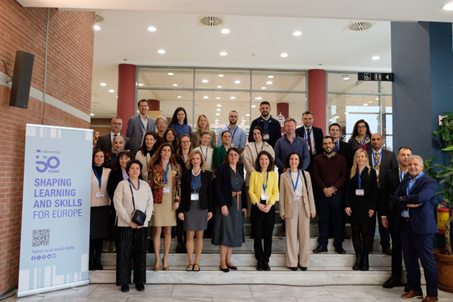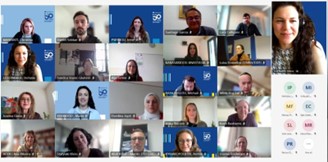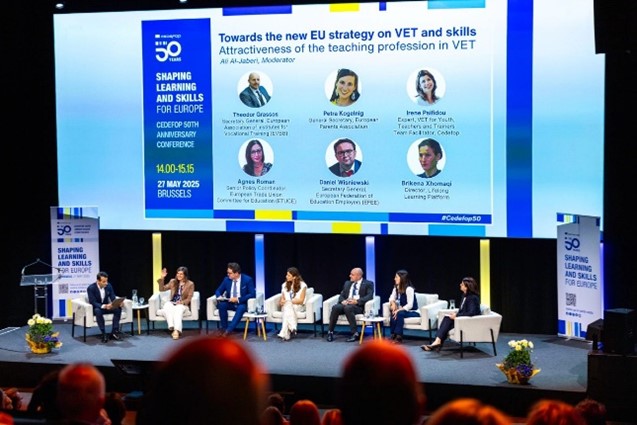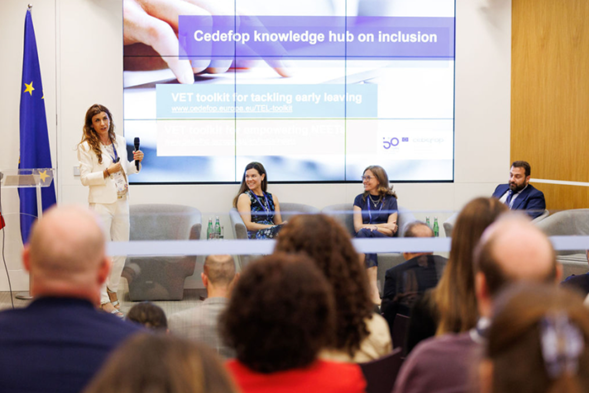In this blog article, you will find a collection of the following information:
- Cedefop events on inclusion
- Promoting our toolkits in EU events
- New resources available on the VET toolkits
- Cedefop related publications
- News from our ambassadors and our new members
Cedefop events on inclusion
Union of Mediterranean, European Commission and ETF study visit at Cedefop


On 29th January 2025, Cedefop was delighted to host a delegation from the Union for the Mediterranean Community of Practice on monitoring, supported by European Commission representatives from DG Employment and Social Affairs, and the European Training Foundation. Together, we explored opportunities for collaboration aimed at supporting the effective inclusion of youth, particularly NEETs, across diverse regions, including Belgium, France, Greece, Israel, Lebanon, Montenegro, Morocco, Palestine, Tunisia, and Turkey. Irene Psifidou and Stefanie Ledermaier from the VET toolkit team presented Cedefop’s work on Connecting NEETs with the Labour Market and Promoting Inclusiveness through VET. This knowledge sharing meeting has set the stage for impactful future collaborations among four leading institutions advocating for inclusion.
Webinar for the Ambassadors tackling early leaving from VET focusing on NEETs

On 10th March 2025, Cedefop’s VET toolkit team organised the 2nd webinar for the 'Ambassadors tackling early leaving from VET' network on young people not in employment, education or training (NEETs).
This webinar focused on two specific topics related to NEETs a) mentoring as an increasingly popular approach to assist NEETs back into employment, education or training, and b) targeted support to female NEETs. Cedefop invited three external speakers, based on their recent good practice contributions to the VET toolkit for empowering NEETs, to share their experience. For more information see here.
Cedefop 50th anniversary conference: Shaping learning and skills for Europe


On 27th May 2025, Cedefop celebrated its 50th anniversary in a high-level event in Brussels on Shaping Learning and Skills in Europe. The event convened over 300 participants from across the EU - policymakers, social partners, researchers, and practitioners - around a shared vision for inclusive, future-ready VET, learning, and skills ecosystems.
Irene Psifidou organised the panel on “The attractiveness of teaching profession” and presented the main challenges Europe faces to attract and retain teachers in VET. High level stakeholders including European social partners for education: ETUCE and EFEE, the European association of VET providers EVBB, the European parents’ association, and the lifelong learning platform debated on teachers’ shortages, teachers’ salaries, working conditions and wellbeing. All panellists stressed that targeted policies to ensure high quality and accessible professional development is key to empower teachers to promote inclusion in VET schools and address the sever teacher shortages in Europe. For more information see here.
18th Cedefop Brussels seminar organised in cooperation with the Polish Presidency of the Council of the EU

On 23rd June 2025, the VET toolkit team organised, in collaboration with the Polish Presidency, Cedefop’s Brussels seminar: Youth in education, youth in employment – Boosting European policies for social inclusion.
The main objective of this seminar was to inform Brussels-based stakeholders about Cedefop’s latest research findings, knowledge hub and interactive toolkits on inclusion, providing an opportunity to showcase successful intervention approaches to empower NEETs as well as to foster policy debate and facilitate networking.
The event focused on strengthening EU policies for youth inclusion, with particular attention to young people not in employment, education or training (NEETs), while Cedefop’s VET toolkit for empowering NEETs was on the spotlight. Moderated by Irene Psifidou (Cedefop), the seminar explored inclusive approaches to VET, micro-credentials, and targeted support systems, especially for female and remote NEETs.
The seminar benefited from the insights of a wide range of dedicated experts and practitioners from across Europe. Key contributions came from Juergen Siebel (Cedefop), Brigitte van den Berg (Member of the European Parliament), Juan Anton Gambina (Jobsplus Malta), Kati Marin (University of Applied Sciences), and Oscar Pasquali (Generation Italy), who each presented concrete solutions for empowering NEETs through inclusive education, training, and employment pathways.
The expert team from Cedefop — Irene Psifidou, Stefanie Ledermaier, Anthie Kyriakopoulou, and Michail Papazoglou — offered data-driven strategies and practical tools. High-level insights were shared by Koen Bois D’Enghien (European Commission), Raffaela Kihrer (EAEA), Karolina Malinowska (Educational Research Institute – National Research Institute, Polish Ministry of Education), Sabina Casini (Confederation of German Employers’ Associations), and Yves Magnan (Le Forem, Wallonia) during the final panel discussion.
See event gallery here.
Promoting Cedefop’s VET toolkits in Europe
2nd ELNE annual conference: Dimensions of collaborative leadership

Irene Psifidou, Cedefop’s coordinator of the ambassadors’ network for tackling early leaving was part of the 2nd annual event of the Educational Leadership Network (ELNE) on Dimensions of collaborative leadership – Exploring together. The Educational Leadership Network Europe (ELNE) is a European Commission-funded network focused on improving collaborative leadership in education. It aims to enhance school leadership by showcasing best practices, facilitating dialogue among stakeholders, and supporting the implementation of European Union policies related to education. Irene presented how Cedefop’s work on inclusion is designed in a collaborative leadership approach highlighting the examples of the VET toolkit for tackling early leaving, the VET toolkit for empowering NEETs and the novel European Vocational Teacher survey steered by the network of ambassadors and the EVTS stakeholder group. The event report is available here.
Cedefop & ETF knowledge sharing event

For years now Cedefop and the European Training Foundation cooperate within their distinctive mandates as EU agencies in many ways in the human capital development domain. One of them are the knowledge sharing events the two sister agencies organise twice a year to present and discuss areas of work of mutual interest. On 20th June 2025, during the hybrid Cedefop-ETF knowledge sharing seminar held in Turin, at the ETF headquarters, Irene Psifidou presented Cedefop’s work and discussed possible vias of collaboration for promoting inclusion for learners at risk, early leavers and NEETs.
Skillman TVET Alliance summit 2025
Our ambassador from Italy, Giovanni Crisonà, organized the Skillman TVET Alliance summit 2025 in Ancona, 9-10 of July. The event attended by EU and Balkan countries aimed to align the network's expertise with the EU Strategy for the Adriatic and Ionian Region (EUSAIR). Key areas included the twin transition to green and digital economies, digital skills development, and entrepreneurship for sustainable growth. Giovanni Crisonà presented the new Skillman Teacher Academy model that aims to provide high quality and relevant professional development of teachers and trainers in VET in different European countries. Irene Psifidou from Cedefop was invited to introduce the event and spoke about: Stemming the tide of teachers’ shortages in Europe: Supporting teachers’ professional development. Irene invited the members of the Skillman network to join the ambassadors’ community to promote inclusion in Europe, and thanked Giovanni for his valuable contribution to this work.

New resources available on our VET toolkits
A great amount of new resources has been uploaded to our two VET toolkits especially to the one on NEETs.
See what is new on the VET toolkit for tackling early leaving
New tool
New good practice
See what is new on the VET toolkit for empowering NEETs
Good practices
A total of 11 good practice examples from across the EU have been added online, which aim to support young people not in employment, education, or training (NEETs) or different sub-groups of NEETs. From these good practices, you may learn about:
- How to use innovative eco-activism to support NEETs (Educational eco-communities)
- Social entrepreneurship (Social Innovators);
- Green entrepreneurship (Trans Green Inspiration);
- How to foster cooperation with employers to offer job placements (Avenir’ Pro);
- Guidance and support for VET pathways (Beyond NEET(D)s);
- An innovative initiative to tackle rural unemployment and depopulation in four EU countries (RAISE Youth);
- An initiative aimed at increasing the participation of young women in the tech industry by providing them with the skills and support needed to launch digital careers (DigitHer);
- Another tech initiative providing NEETs with the training and support needed to start careers in digital professions (Tech Your Future);
- A transnational initiative aimed at reducing youth unemployment and addressing social exclusion among NEETs (DARE);
- Preparing NEETs for remote and hybrid job opportunities across multiple sectors (Go Remote); and,
- A platform that consolidates learning opportunities within a specific city, and by incorporating gamification elements, recognising and validating small achievements through microcredentials (Lisbon City of Learning).
Two new intervention approaches
NEETs living in remote areas – Bridging the geographic divide
Rural NEETs face distinct challenges due to limited access to education and employment opportunities, exacerbated by inadequate transportation and fewer social services compared to urban areas. These barriers contribute to higher NEET rates, with cultural norms and economic contexts shaping career choices. Addressing these issues requires strategies that focus on understanding rural NEETs' needs, involving them in policy design, and utilising digital technologies to bridge the digital divide. Such tailored interventions can empower rural NEETs to access new career paths and enhance their skills, fostering inclusivity and economic growth in remote areas.
Preparing NEETs to access green jobs
NEETs, amidst evolving labour market dynamics such as the green transition, face unique challenges due to a lack of access to relevant education and training opportunities. These barriers can hinder their ability to gain the necessary skills for emerging green jobs. To address this, strategies focusing on equipping NEETs with green skills through targeted training programmes are essential. This involves creating relatable pathways that align with their interests and aspirations, and utilising digital platforms to enhance their engagement. By doing so, NEETs can be empowered to explore sustainable career paths, aligning workforce capabilities with industry needs and fostering inclusivity and economic growth.
Publications
- A total of 35 new publications concerning NEETs have recently been added. Please see here.
Spotlight on recent Cedefop publications
- The profile of NEETs teachers in Greece by Anthie Kyriakopoulou
- Fostering literacy through inclusive vocational education by Stefanie Ledermaier
- Embracing digital skills in vocational education by Michail Papazoglou
- Breaking the cycle: tackling bullying and early leaving to empower learners

This headline and blog article on tackling violence and bullying at school to prevent dropout and facilitate school success, written by Cedefop’s VET toolkit team, discusses the significant impact of bullying on students, highlighting how this may increase the likelihood of dropping out and early school leaving, limiting future opportunities. Cedefop aims to add to evidence-based strategies, including interactive toolkits and collaborative networks, to create safer and more inclusive learning environments.
- Breaking barriers for young women not in employment, education, or training

This article describes the persistent gender gap in NEET rates across the EU, with young women being disproportionately affected due to structural gender biases and caregiving responsibilities. It emphasises the need for targeted policies and VET programmes to support young women and reduce the NEET rate fostering greater social cohesion. The article draws from the new intervention approach available on the VET toolkit for empowering NEETs available here.
News from our toolkit's ambassadors
Our ambassador from Spain, Inma Vitaller, is involved in ESF distance learning course (30-hour), held in June 2025 in the Valencian Community, Spain, for teachers of the "Personal itinerary for employability" (IPE) module in basic vocational training. This aims to help teachers understand the challenges of basic vocational training, promote students' educational and professional growth, and enhance their self-awareness of competences. The course content includes an introduction to the IPE module, learning outcomes, key concepts, and classroom methodologies, targeting teaching staff and educational technical staff in non-university educational centres, with specific requirements for VET teachers.
Our ambassador from Spain, Sofia Leitão, in May 2025 was part of the HUMAN consortium which hosted its Youth Diversity Panels (YPD) meeting in Rome, bringing together young people from various European countries, educators, and youth workers. The event focused on confronting online hate speech through youth-led digital activism, showcasing how civic engagement can foster inclusion and re-engagement in education and training.

Our ambassador from Spain, Fernando Marhuena Fluixá, is involved in RecoVET which addresses the need for effective evaluation and recognition of quality in refugee integration within VET. He has also shared multiple publications of his recent work which focus on various critical aspects of second chance schools. These include personal, vocational and occupational guidance in second chance schools, organisational analysis of accredited second chance schools, second chance schools and their impact on youth, and the second chance schools as socio-educational organisations.
Our ambassador from Portugal, Maria Manuel Casal Ribeiro, shared the Erasmus for Young Entrepreneurs programme. It is a cross-border exchange initiative that allows new or aspiring entrepreneurs to learn from experienced entrepreneurs running small businesses in other participating countries. The exchange involves a stay of 1 to 6 months with a host entrepreneur, during which the new entrepreneur gains essential skills to run a small firm. This collaboration benefits both parties, offering fresh perspectives and opportunities for international cooperation. The visit is partially funded by the European Union through a monthly grant.
Our ambassador from Italy, Elisabetta Buono, is involved in ’’Completion and dropout pathways in intensive dual VET’’ project aiming to analyse the factors influencing the completion and dropout processes in Intensive Dual VET (IDVET) programmes in Spain. She has also developed comprehensive maps of tools designed to enhance lessons and enrich them with free online applications and resources. These tools are specifically aimed at training teachers who are involved in combating early school leaving. She typically presents these tools alongside the Cedefop toolkits, particularly with the VET toolkit for tackling early leaving. Her work covers a range of innovative educational approaches including AI a supporto della didattica, STEM/STEAM, Digital Storytelling and Quale Digital Storytelling.
Our ambassador from EfVET, Valentina Chanina and Roberta Richiero introduced the ENGIM ETS, an Italian foundation active in vocational training and social and labour inclusion, which is the leader of a national and transversal partnership implementing the project I CARE - Cambiare Accompagnare Riscoprire Esperienze, with the support of Fondazione Con i Bambini, Fondazione da Sud and Morgane Chase. The initiative aims at tackling school dropouts and NEETs in an innovative way through individual tutoring, experiences in real work contexts and workshops on soft skills and digital competences. At the heart of the initiative is the construction of active and inclusive territorial networks and educating communities, capable of detecting the most fragile young people at an early stage and guiding them towards paths of growth and autonomy. A replicable model that also deserves attention from a European perspective.
Our ambassador from Generation Daniel Soldan shared the annual Europe Impact Report 2024-2025, which highlights the power of partnerships and collaboration in creating sustainable career pathways across Europe. This report showcases how such collaborations have enabled Generation to support nearly 20,000 graduates coming from vulnerable backgrounds into life-changing employment across France, Ireland, Italy, Spain, and the United Kingdom. Additionally, a case study has been successfully validated at the Social Innovation Match (SIM) database and is now visible to the public. To check it out, navigate to: Tracking What Matters: A data framework to drive decisions and prove long-term impact.
Meet our new ambassadors
URBACT, Croatia | Ivana Baćović is an expert in URBACT, focusing on the knowledge economy, local economy, social innovation, and communication. She is a member of the ENoLL working groups on education and learning, health and well-being, gender in innovation, and serves as a mentor in the latter. Previously, she worked as a communication officer in the Interreg-IPA CBC Bulgaria-Serbia programme, an HR trainer in the GrECo group, and as a consultant and expert in various EU and UN projects focused on local/regional socio-economic development. She is experienced in capacity building and training and is one of the pioneers of the social responsibility movement. |
Rinova, Spain | Sofia Leitão is the Principal Development Manager at Rinova. She graduated in Sociology, holds a MA in Journalism Studies, and a PhD in Media Studies looking at representations of childhood and youth in media, approaching agency and inclusion. She has worked for over a decade for the enhancement of human rights and the rights of the child, and she is a published author in the field. She is currently part of the team operating 'EQAVET 4.0 for quality in outcome-oriented VET' Centre of Vocational Excellence (CoVE). |
Generation, Austria | Daniel Soldan is the Europe strategy and special projects associate at Generation, a global NGO working towards the economic mobility of vulnerable people. In this position, he implements the organisation’s advocacy agenda in Europe, support European country affiliates with various projects and initiatives, and foster a European community within Generation. He has previously worked for the United Nations office on drugs and crime, the International Atomic Energy Agency, and the mission of the European Union to the international organisations in Vienna. |
Jugend am Werk Steiermark GmbH, Austria | Rene Halla is a coordinator for EU-funded projects, mainly Erasmus+, including the Erasmus+ best practice project ‘Beyond Neet(D)s’, at Jugend am Werk Steiermark GmbH in Graz, Austria. He has long-time working experience as apprenticeship instructor in VET, youth, and adult education. He is a professional civil rights mediator and expert in accelerated learning techniques. René’s motivation to join this network is to support marginalised learners in VET and to create a more inclusive and just learning environments for all. |
EVTA, Europe | Giulia Meschino has been working for EVTA since June 2013, in charge of the development and implementation of the network’s strategy. She gained an in-depth knowledge of European policies on VET by carrying out several concrete activities to boost excellence and quality in the training provision. She holds a master's degree in International Relations and Diplomatic Affairs at University of Bologna, and an executive master's in Management of International Organisations at the Solvay Business School. Before moving to Belgium, she had the opportunity to enrich her life experiences by studying and working in France, United Kingdom, Malta, and Albania. She is an enthusiastic member and representative of the VET4EU2 platform and has acquired expertise on internationalisation and vocational excellence by contributing as an expert in several projects and initiatives, as a speaker in different EU and national events, and by leading the implementation of different EU funded projects on these topics. |
Digital Coalition, Slovakia | Alena Minns currently works as a project coordinator and education expert in the Digital Start project, implemented by the Digital Coalition. The project supports young NEETs by assessing their potential and helping them reintegrate into the labour market and engage in further education. Previously, she coordinated several national and international projects, led professional teams, and contributed to labour market analysis and human resources development planning. Her professional interests include the impact of Industry 5.0 on skills development, lifelong learning, non-formal youth education, youth policy, age management, and teacher development. Alena’s motivation to join the Ambassadors of Vocational Education stems from her strong commitment to aligning education with labour market needs. She seeks to promote vocational education as a modern, attractive path for young people and believes the ambassador network can drive innovation and relevance in the field. |
Important Note
As we continue to work together to develop and disseminate our toolkits, we kindly remind you that your role does not constitute an official representation of Cedefop. You may refer to your role as “ambassador for tackling early leaving in Europe” but please refrain from using the title "Cedefop Ambassador" in your email signatures, communications, and other external interactions.
Thank you for your understanding and cooperation.
Enjoy your summer!
Author
Irene Psifidou, Stefanie Ledermaier, Maria Toskidou and Christina Karkanti
Related Theme
VET for youth - Teachers and trainers
Related Project
Early leaving from education and training
Teachers’ and trainers’ professional development
Related Network

 Ms Ivana Baćović
Ms Ivana Baćović Ms Sofia Leitão
Ms Sofia Leitão Mr Daniel Soldan
Mr Daniel Soldan Mr Rene Halla
Mr Rene Halla Ms Giulia Meschino
Ms Giulia Meschino Ms Alena Minns
Ms Alena Minns